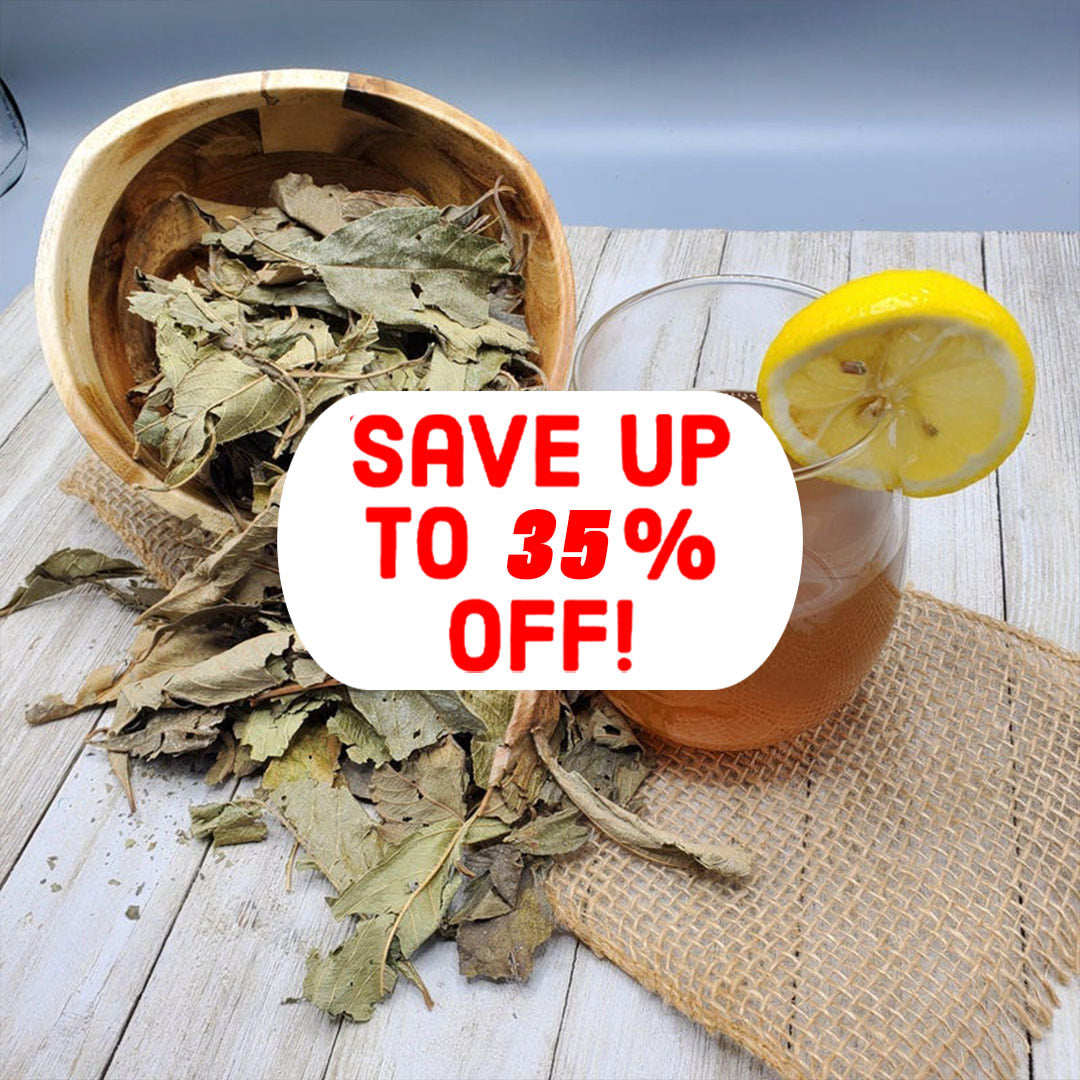Sambatree
BULK TEA- KINKELIBA TEA
BULK TEA- KINKELIBA TEA
Couldn't load pickup availability
Pronounced: KINK-KA-LEE-BAH
FLAVOR:
Smooth & creamy, woodsy & 'sweet' (meaning it doesn't have a bitter taste)
Pairs well with honey, honey/lemon, OR your milk of choice.
(We LOVE it with just honey, as it brings out the smoothness and creaminess of the tea).
Kinkeliba, also known as seh-haw, can be made as a mild or strong brew.
Mild = Use less leaves & shorter brew time
Strong = Use more leaves & longer brew time
Some like to add ginger or other spices to it as well.
HOW IT'S ENJOYED IN WEST AFRICA:
Kinkeliba tea is enjoyed several times a day as an infusion, just like coffee or green tea. Simply brew a handful of leaves in 4-5 cups of hot water.
Add lemon during the first infusion for a zingy freshness.
During the day, brew the same leaves again and this time add your favorite milk (we recommend non-dairy). The taste will transport you to Senegal and Burkina Faso!
NOTE: Do not consume kinkeliba during pregnancy or when breastfeeding.
-----------------
CHARACTERISTICS OF KINKELIBA
A natural tonic used for generations, kinkeliba is a plant native to West Africa,
A mainstay of herbal medicine for generations, this remarkable plant is considered the miracle remedy in West Africa. However, kinkeliba remains relatively unknown outside the African continent.
KINKELIBA THE PURIFIER
In African traditional medicine, this powerful plant is used as an infusion for its anti-inflammatory and antibacterial effects, while its purifying and detoxifying actions work as a liver tonic. Not only that, but thanks to sweet woody flavour, it also makes a really enjoyable drink, hot or cold.
It is used traditionally in Senegal and Mali for fatigue, liver ailments, headache, convalescence, blood disease, weight loss, cancer, sleep problems, and used during times of fasting. Kinkeliba means the "health tree" and the French import kinkeliba and call it "tisane de longue vie" or infusion of long life.
1. Diabetes Prevention and Treatment
Studies have found that Kenkeliba tea has benefits in both preventing and treating diabetes.
The flavonoids in Kenkeliba:
- Increase glucose tolerance
- Lower glucose production and levels, even without weight loss
- Decrease the PEPCK enzyme, which could help treat insulin-resistant diabetes
2. Anti-Inflammatory
The antioxidants in Kenkeliba tea help fight inflammation, which in turn can provide a range of benefits for conditions like eczema, psoriasis, and inflamed gut.
Unfortunately, the full anti-inflammatory benefits of Kenkeliba havne’t been well studied but one study did find that taking Kenkeliba reduced edema, vascular permeability, and blocked granuloma formulation.
3.Antioxidant Properties
Rich in catechins, kinkeliba is powerful antioxidant, and helps protect skin from signs of aging. It works by ridding the body of free radicals such as pollution or pesticides. These external factors can harm skin cells but kinkeliba acts as a shield.
3. Fighting Viral Infections
Kenkeliba extracts have antiviral and antimicrobial properties.
One study found that Kenkeliba could be used to treat herpes viruses. And I’ve seen Kenkeliba being listed as a cure for diaper rash because of its antibacterial activity.
4. Weight Loss
Traditionally, Kenkeliba tea is used to help weight loss; as it helps stabilize glucose levels (so you don’t feel as hungry) and detoxes the body.
5. Diuretic
A well-known diuretic locally, Kenkeliba can help increase urine production and flush excess water from the body.
6. Gallstones and Bile Issues
Kenkeliba will help extract bile from the gallbladder, which can prevent gallstones and speed up passing gallstones.
7. Digestion and GI Issues
Traditionally, Kenkeliba is used to help with a variety of GI issues such as diarrhea, vomiting, food poisoning, and other stomach bugs. Studies attribute these benefits to the anti-microbial and anti-inflammatory properties of the plant.
8. Other Benefits
In local medicine, Kenkeliba has been used for numerous other health benefits.
- Circulation
- Insomnia treatment
- Infertility
- Wound healing
- Colic
- Clearer skin
References:
https://www.sciencedirect.com/science/article/pii/S102194981730100X?via%3Dihub
https://link.springer.com/article/10.1163/156856003322315631
https://healthbenefitsof.org/health-benefits-of-kinkeliba/
https://www.sciencedirect.com/science/article/abs/pii/016635429390010G
________________________
HOW TO MAKE A CUP:
- Place a heaping tablespoon of Kenkiliba tea in a mug.
- Then pour 1 cup of hot water into the mug.
- Cover with a small plate (or mug cover) and allow to steep for 5-10 minutes. The longer you steep the leaves, the stronger the flavor.
- Add sweetener, and/or lemon to taste. Or, milk and honey. If you’re planning to serve it cold, allow the tea to cool to room temperature before pouring over ice.
HOW TO MAKE A POT:
Put 1 cup of leaves into your pot along with 6-8 cups of water (quantity depends on the strength of brew you desire). Boil for 3 minutes, then cover and allow to steep or simmer on low for 10-15 mins. Add sweetener of choice and enjoy!


